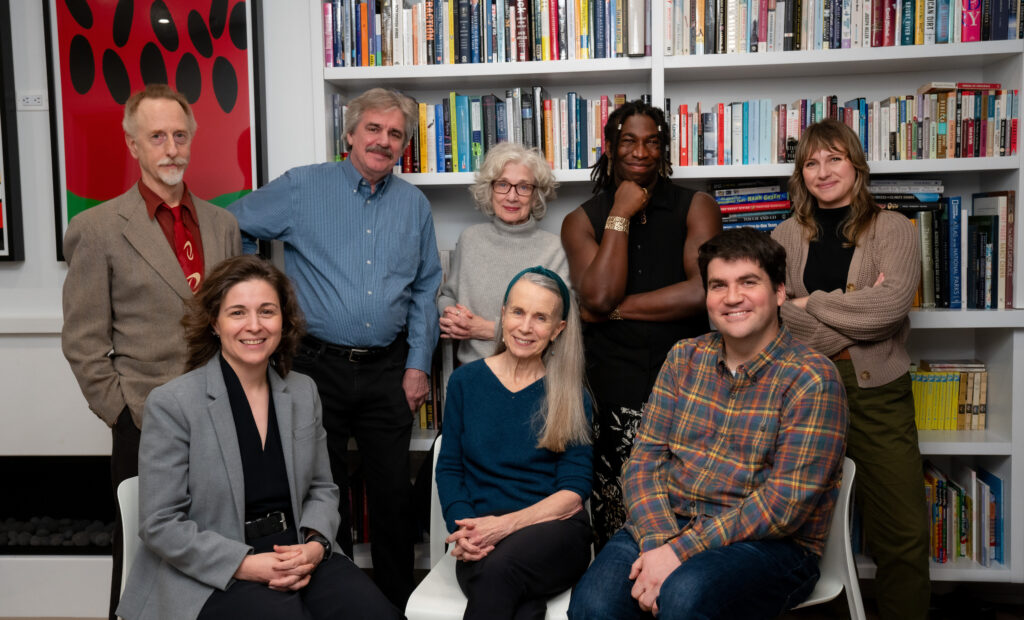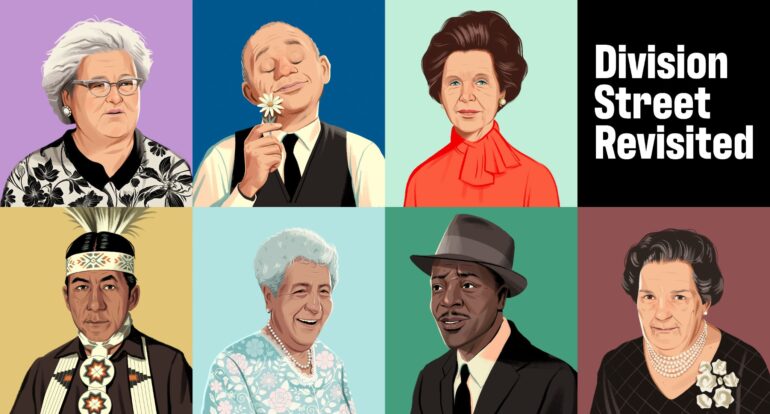In the 1960s, Myra Alexander fought against racism.
Bill Koza craved tolerance toward gay people.
Della Reuther protested against war.
Ben Bearskin preserved Native American culture.
Mary Ward Wolkonsky promoted the civic role of women.
Leon Beverly battled for union workers and neighbors.
And Blanche Gates, a widowed mother of 15, kept her family strong.
The stories of these seven Chicagoans come to life in a compelling podcast that debuted this winter: “Division Street Revisited.” This podcast is a follow-up to the 1967 oral history book Division Street: America by Chicago icon Studs Terkel. The book featured 71 interviews with “ordinary” people. But these people were far from ordinary, as the “Revisited” crew learned when they dug deeply into these seven stories.
Building the Podcast Team
The idea for the podcast came from Melissa Harris, a former Chicago Tribune business columnist who runs her own marketing firm, M. Harris & Co. Harris recruited former Tribune columnist and Pulitzer Prize winner Mary Schmich to write and narrate the series.
And then they invited me, Mark Jacob, aboard. I’m a former metro editor at the Chicago Tribune, where I was Mary’s editor. But we needed audio experts, so we recruited Bill Healy — a Pulitzer winner in his own right — and widely respected former WBEZ producer Cate Cahan. We got Chris Walz of the Old Town School of Folk Music to produce the music and recruited audio engineers Libby Lussenhop and Chijioke Williams to make the final product sing.

From Book to Podcast: Sharing Timeless Stories
The “Revisited” crew researched far beyond Studs’ book, tracking down relatives and others who could add to the fascinating stories of their lives. We wanted to know more about our characters and whether their hopes and dreams for the future had been fulfilled.
For example, Myra Alexander, a school janitor who met Studs on the train to the 1963 March on Washington, is well represented in today’s world by her grandson Alex Blocker, a violinist who protests against police misconduct. And April Ward Bodman, granddaughter of civic activist Mary Ward Wolkonsky, said that if her grandmother had been born in a less sexist era, she might have become president. Wolkonsky, who lived in a variety of Chicago area locales such as Lake Forest, Marina City, and the Carlyle, was a Make It Better Foundation kind of person who always got people organized to improve the world around them.
The takeaway from the seven episodes is that many of the issues that Studs raised are still with us. Women have more rights but still have not reached the nation’s highest office. Black Americans are still struggling for social justice. The rights of LGBTQ people remain under attack. The preservation of Native American culture faces continuing threats.
As the episodes have been released — on WBEZ 91.5 FM radio and on podcast platforms — listeners have told us that these people’s hopes have given them hope, too, as our nation weathers challenging times.
The National Endowment for the Humanities provided major funding for “Division Street Revisited.” Additional funders include M. Harris & Co., the Field Foundation of Illinois, the Gaylord & Dorothy Donnelley Foundation, the Susan H. Schwartz Charitable Trust, Debra D. Schwartz, and Julia Stasch.
In-kind support is provided by PRX, WBEZ 91.5/Chicago Public Media, Chicago History Museum, Chicago Public Library, Old Town School of Folk Music, Facing History & Ourselves, the Balzekas Museum of Lithuanian Culture, and MG Strategy + Design.
It took all those people and groups to summon the past and use it to explore the present.
How to Help
Division Street Revisited follows up on seven stores from Studs Terkel’s groundbreaking 1967 oral history, Division Street: America.
You can support the podcast by listening to it on Spotify or Apple.
And you can support public service journalism and Chicago Public Media’s mission — providing in-depth, original reporting and programming that informs, engages and improves the lives of people in our communities, by donating to WBEZ.

Mark Jacob is the former metro editor of the Chicago Tribune and currently writes the Stop the presses newsletter about politics and media.
This post was submitted as part of our “You Said It” program.” Your voice, ideas, and engagement are important to help us accomplish our mission. We encourage you to share your ideas and efforts to make the world a better place by submitting a “You Said It.”

